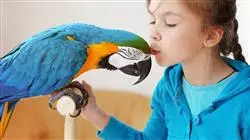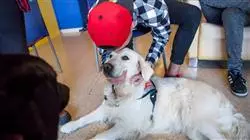University certificate
The world's largest faculty of veterinary medicine”
Description
Don't miss this great opportunity and update your knowledge on everything related to Animal-Assisted Interventions and their use in occupational therapy”

Today, the multiple physical, social and mental benefits of interacting with animals in controlled environments are indisputable. In fact, such benefits were already present in therapeutic contexts long before documented scientific evidence was made widely available.
This academic program will focus on gathering and understanding the different lines of intervention used in the area of Animal-Assisted Therapies and Interventions. To this end, this program offers specialized knowledge to adequately form a bond with animals, specifically with dogs, which often trained for these purposes, while respecting their nature and understanding their way of learning.
This specialization also addresses the set of techniques and exercises necessary to intervene as therapists at a psychomotor level, using horses as co-therapists in such a way so as to work on a physical, emotional, sensory, cognitive and social level.
At the same time, this training utilizes an alternative methodology for using birds in captivity to generate benefits both in humans and in the birds themselves, not without first understanding their characteristics as a species that mostly thrives in a natural environment.
Finally, the program offers specialized knowledge about non-conventional animals that regularly participate in Assisted Interventions, characteristics and recommendations in terms of their care, work methodologies with respect to both birds and users, pathologies for which these animals are suited and the basic parameters that ensure their well-being.
All of which leads to veterinary professionals obtaining better results through the work and intervention programs they developed.
This postgraduate diploma is the opportunity you were waiting for to take your career to the next level and become a prestigious veterinarian”
The postgraduate diploma in Canine, Equine, Avian and Non-Conventional Animal-Assisted Interventions contains the most complete and up-to-date educational program on the market. The most important features of the program include:
- Practical cases presented by experts in Animal-Assisted Therapies
- The graphic, schematic, and eminently practical contents with which they are created, provide scientific and practical information on the disciplines that are essential for professional practice
- Breakthroughs in Animal-Assisted Therapies
- Practical exercises where self-assessment can be used to improve learning
- Special emphasis on innovative methodologies in Animal-Assisted Therapies
- Theoretical lessons, questions to the expert, debate forums on controversial topics, and individual reflection assignments
- Content that is accessible from any fixed or portable device with an Internet connection
A high-level program, especially designed to update student knowledge in a comfortable and effective way”
The teaching staff is made up of professionals in the field who bring to this program the experience of their work, in addition to recognized specialists from prestigious reference societies and universities.
The multimedia content, developed with the latest educational technology, will provide the professional with situated and contextual learning, i.e., a simulated environment that will provide immersive training programmed to train in real situations.
This program is designed around Problem-Based Learning, whereby the specialist must try to solve the different professional practice situations that arise during the academic year. For this purpose, the professional will be assisted by an innovative, interactive video system created by renowned and extensively experienced experts in Animal-Assisted Therapies.
You will have at your disposal the best didactic material, which will provide you with a contextual study to facilitate your learning"

As this is a 100% online academic program, you will be able to balance your studies with your professional work"
Objectives
The objective of this academic program is to help veterinarians understand the significance of the desired results that Animal-Assisted Therapies provide people with social and behavioral problems. Thus, after completing this postgraduate diploma, professionals will be fully capable of designing and implementing this type of interventions, offering optimal conditions for both the animals and the users participating in the therapy. This will not only increase their professional skills, but will also turn them into first level practitioners.

Your goals and ours at TECH become one and the same with this academic program”
General Objectives
- Analyze the natural behaviors of the canine species in order to convert them into capacities and potentialities in the use of Assisted Interventions
- Make an objective assessment of the characteristics and minimum requirements that an Assisted Intervention dog must have in terms of its behavioral development
- Generate skills and management tools in guide animal through the understanding of canine learning to facilitate the development of a working session
- Identify the minimum care dogs require and the problems that may arise in a working session
- Develop specialized knowledge of horse ethology
- Choose the right horse for the interventions
- Compile techniques to work with horses
- Determine the importance of horse care
- Analyze the natural behaviors of the different avian species in order to convert them into capacities and potentialities in the use of Assisted Interventions
- Make an objective assessment of the characteristics and minimum requirements that an Assisted Intervention dog must have in terms of its behavioral development
- Generate skills and management tools in guide animal through the understanding of avian learning to facilitate the development of a working session
- Identify the minimum care birds require and the problems that may arise in a working session
- Determine which are the unconventional animals in Assisted Interventions
- Analyze their basic behavior and biology
- Develop the most recommended training and work techniques
- Evaluate the most notable problems for their involvement
Specific Objectives
Module 1. Canine-Assisted Interventions
- Examine the development of the natural behaviors of dogs, both instinctive and acquired, and the influence of human behavior in each of them
- Conduct a detailed evaluation of the positive behaviors in the dog to be incorporated into an Assisted Intervention Program, as well as the behaviors that could generate problems in the learning process
- Adequately interpret the results of behavioral selection tests performed on the dogs to be included in the Assisted Intervention Program
- Generate a training protocol according to the qualities of the dog and the work objectives in each session
- Propose methodological alternatives in the intervention sessions based on the objectives previously set for each user
- Routinely assess the health status of intervention dogs, identifying red flags or signs of discomfort for timely veterinary action and care
- Identify behavioral problems that develop in intervention dogs before, during, and after sessions with users
Module 2. Equine-Assisted Interventions
- Analyze the horse's behavior
- Determine the role of the horse in therapy
- Examine the profile of horses suitable for therapy
- Develop an appropriate method of horse care
- Compile the necessary material for each intervention
- Specify the activities and techniques for the intervention
- Analyze the different pathologies and the choice of horse according to patient characteristics
Module 3. Avian-Assisted Interventions
- Identify the physical and behavioral aspects within the nature of the different species of birds used in Assisted Interventions
- Examine the uses given to birds throughout history
- Establish the main characteristics that a bird must have in order to provide a service in interventions
- Identify the different management tools for training and activities with intervention birds
- Evaluate the optimal adaptation of bird handling facilities to ensure the maximum possible well-being
- Develop the preparation methodology for a bird while observing the objectives sought in Assisted Intervention sessions
- Determine the health status of intervention birds, identifying red flags or signs of discomfort for timely veterinary action and care
- Identify behavioral problems that develop in intervention birds before, during, and after sessions with users
Module 4. Non-Conventional Animal-Assisted Interventions
- Determine the intervention scenarios with unconventional animals
- Delimit the field of intervention for each species of animal
- Explore relevant training strategies
- Evaluate the mechanisms of such interventions
- Promote awareness of the responsible use of these animals in AAIs
- Educate on the importance of ensuring animal well-being
- Propose future perspectives in the field of intervention and animal well-being

A unique specialization program that will allow you to acquire advanced training in this field"
Postgraduate Diploma in Assisted Intervention with Canines, Equines, Birds and Non-Conventional Animals
Are you passionate about working with animals and helping people through assisted intervention? If so, the Postgraduate Diploma in Assisted Intervention with Canines, Equines, Birds and Non-Conventional Animals from TECH Technological University is the perfect program for you. At our institution you will learn the most effective techniques and methodologies to carry out assisted interventions using a variety of animals, including canines, equines, birds and other non-conventional animals. You will discover how these wonderful beings can contribute to the well-being and development of people in different contexts, such as therapy, education and rehabilitation. Animal-assisted intervention has proven to be a powerful therapeutic tool that helps improve the quality of life of people of all ages. Canines, equines, birds and other non-conventional animals have a positive impact on the emotional, physical and cognitive state of people, promoting learning, communication, self-esteem and emotional connection. In this program, you will acquire the necessary knowledge about animal behavior, the selection and training of intervention animals, the planning and execution of therapeutic sessions, and the evaluation of results. You will also learn about ethical and animal welfare considerations in assisted intervention.
Add a great specialization to your resume
The Postgraduate Diploma in Assisted Intervention with Canines, Equines, Birds and Non-Conventional Animals is taught online, which gives you the flexibility to study from anywhere and adapt your schedule to your personal and professional needs. You will have the support of experts in assisted intervention and case studies that will help you apply the concepts learned in real situations. This program is aimed at professionals from different fields, such as psychology, occupational therapy, pedagogy, special education, social work and other related fields, who wish to specialize in animal-assisted intervention. It is also suitable for those interested in starting a career in this growing field with great job opportunities.







